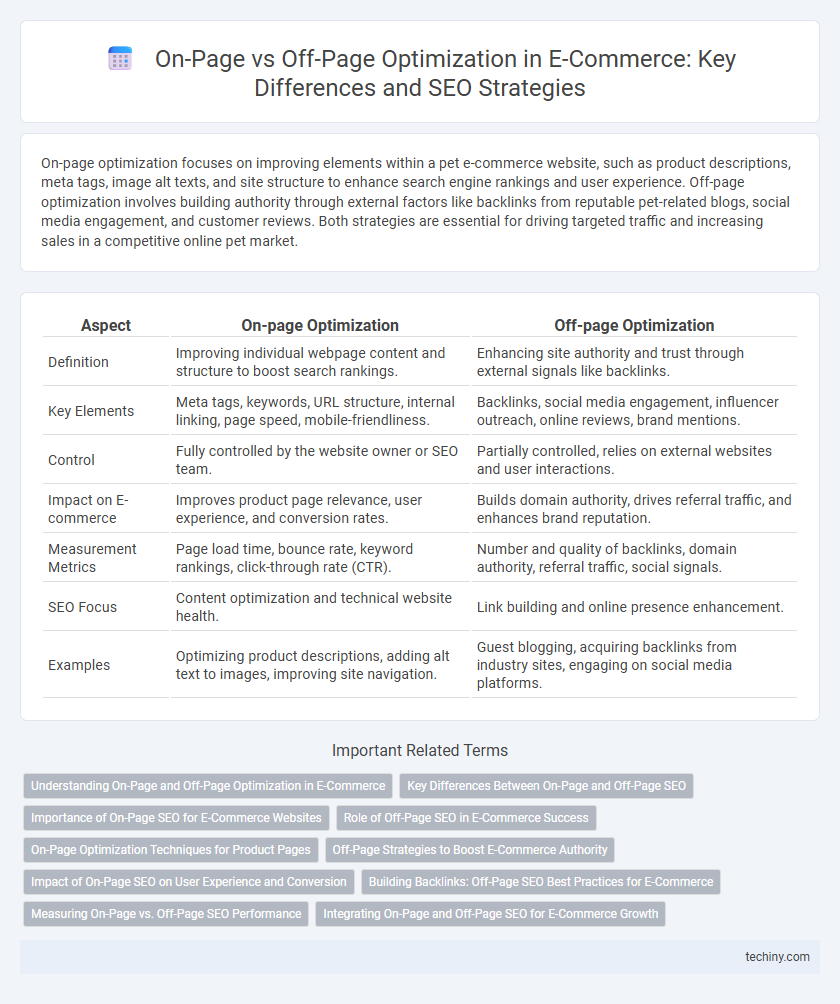On-page optimization focuses on improving elements within a pet e-commerce website, such as product descriptions, meta tags, image alt texts, and site structure to enhance search engine rankings and user experience. Off-page optimization involves building authority through external factors like backlinks from reputable pet-related blogs, social media engagement, and customer reviews. Both strategies are essential for driving targeted traffic and increasing sales in a competitive online pet market.
Table of Comparison
| Aspect | On-page Optimization | Off-page Optimization |
|---|---|---|
| Definition | Improving individual webpage content and structure to boost search rankings. | Enhancing site authority and trust through external signals like backlinks. |
| Key Elements | Meta tags, keywords, URL structure, internal linking, page speed, mobile-friendliness. | Backlinks, social media engagement, influencer outreach, online reviews, brand mentions. |
| Control | Fully controlled by the website owner or SEO team. | Partially controlled, relies on external websites and user interactions. |
| Impact on E-commerce | Improves product page relevance, user experience, and conversion rates. | Builds domain authority, drives referral traffic, and enhances brand reputation. |
| Measurement Metrics | Page load time, bounce rate, keyword rankings, click-through rate (CTR). | Number and quality of backlinks, domain authority, referral traffic, social signals. |
| SEO Focus | Content optimization and technical website health. | Link building and online presence enhancement. |
| Examples | Optimizing product descriptions, adding alt text to images, improving site navigation. | Guest blogging, acquiring backlinks from industry sites, engaging on social media platforms. |
Understanding On-Page and Off-Page Optimization in E-Commerce
On-page optimization in e-commerce involves enhancing individual product pages with targeted keywords, optimized meta tags, high-quality images, and clear CTAs to improve search engine rankings and user experience. Off-page optimization focuses on building domain authority through backlinks, social media engagement, influencer collaborations, and customer reviews to increase brand visibility and trust. Both strategies are essential for a comprehensive SEO approach that drives organic traffic and boosts online sales.
Key Differences Between On-Page and Off-Page SEO
On-page optimization involves enhancing individual e-commerce product pages through keyword-rich content, optimized meta tags, and fast-loading images to improve search engine rankings. Off-page optimization focuses on building domain authority and trust via backlinks, social media signals, and influencer collaborations that drive external traffic. The key difference lies in on-page SEO controlling internal site elements, while off-page SEO targets external factors influencing Google's ranking algorithms.
Importance of On-Page SEO for E-Commerce Websites
On-page SEO is critical for e-commerce websites as it directly influences search engine rankings through optimized product descriptions, meta tags, and keyword-rich content. Proper on-page optimization improves user experience by ensuring fast loading times, mobile responsiveness, and clear navigation, which increases conversion rates. Unlike off-page SEO, on-page factors are fully controllable by the site owner, making them essential for building a strong online presence and driving organic traffic.
Role of Off-Page SEO in E-Commerce Success
Off-page SEO plays a critical role in e-commerce success by enhancing domain authority through high-quality backlinks from reputable websites, which improves search engine rankings and drives organic traffic. Social media engagement and influencer partnerships amplify brand visibility and customer trust, directly influencing conversion rates. Effective off-page strategies complement on-page optimization by expanding online presence beyond the website, fostering credibility and long-term customer relationships.
On-Page Optimization Techniques for Product Pages
On-page optimization techniques for product pages in e-commerce include keyword-rich product titles, detailed and unique product descriptions, and optimized meta tags that enhance search engine visibility. High-quality images with descriptive alt text, structured data markup for product information such as price and availability, and fast page load speeds also improve user experience and SEO performance. Implementing internal linking to related products and user-generated reviews further boosts relevance and helps increase organic traffic and conversion rates.
Off-Page Strategies to Boost E-Commerce Authority
Off-page optimization for e-commerce focuses on building high-quality backlinks, social media engagement, and influencer partnerships to enhance domain authority and search engine rankings. Effective off-page strategies include guest blogging, digital PR campaigns, and customer reviews that generate trust and drive referral traffic. These efforts increase brand visibility, improve site credibility, and contribute significantly to organic search performance.
Impact of On-Page SEO on User Experience and Conversion
On-page SEO directly enhances user experience by improving website speed, mobile responsiveness, and clear navigation, which reduces bounce rates and increases time-on-site metrics. Optimized product descriptions, keyword-rich content, and structured data contribute to better relevance and trust, driving higher conversion rates. Effective on-page elements create a seamless shopping experience that encourages users to complete purchases and return for future transactions.
Building Backlinks: Off-Page SEO Best Practices for E-Commerce
Building high-quality backlinks is a critical aspect of off-page SEO for e-commerce websites, significantly improving domain authority and search engine rankings. Effective strategies include guest posting on relevant industry blogs, partnering with influencers, and acquiring backlinks from reputable directories and niche-specific forums. Consistent outreach and creating shareable, valuable content help attract organic links that drive referral traffic and boost online visibility.
Measuring On-Page vs. Off-Page SEO Performance
Measuring on-page SEO performance involves analyzing metrics such as page load speed, keyword density, meta tag optimization, and user engagement signals like bounce rate and time on site. Off-page SEO performance is assessed through backlink quality, domain authority, social media shares, and referral traffic that indicate external credibility and influence. Combining these data points offers a comprehensive view of a website's search engine visibility and ranking potential in e-commerce.
Integrating On-Page and Off-Page SEO for E-Commerce Growth
Integrating on-page and off-page SEO strategies boosts e-commerce growth by enhancing website relevance and authority simultaneously. Optimizing product descriptions, meta tags, and internal linking improves user experience and search engine rankings, while off-page efforts like acquiring quality backlinks and social media engagement increase domain authority and referral traffic. A synergistic approach leverages keyword targeting and external signals to drive higher organic visibility, ultimately increasing conversions and sales.
On-page Optimization vs Off-page Optimization Infographic

 techiny.com
techiny.com